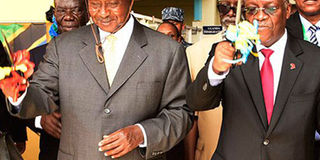Uganda petitions Tanzania over dipping trade relations

President Museveni (L) and his Tanzanian counterpart John Pombe Magufuli. The two leaders have previously met to discuss the dipping trade relations. FILE PHOTO
What you need to know:
- Tanzania has in the last two years been denying entry for Ugandan goods.
- The country recently slapped Ugandan sugar with a 25 per cent Excise Duty contrary to requirements of the EAC Market Protocol.
Kampala. Uganda has petitioned Tanzania on a number of issues that have negatively impacted trade between the two countries.
Speaking on the sidelines of Uganda Export Promotions Board, Mr Richard Okot, the assistant commissioner external trade in the Ministry of Trade, told Daily Monitor that Uganda has requested for a bilateral meeting with Tanzania to address trade concerns.
“Issues with Tanzania are not new. We have scheduled a meeting to sort out all those issues,” he said.
The meeting follows recent concerns over denying entry to some of Ugandan products into Tanzania and slapping some with prohibitive taxes.
Tanzania recently announced it would slap Ugandan sugar with a 25 per cent contrary to the East Africa Common Market Protocol.
Other products that have been denied entry into the country include sweets and other sweeteners that Tanzania claims are re-exported from other countries.
Ms Hadija Nakakande, the Ministry of Trade public relations manager, early this week confirmed they had petitioned Tanzanian to address issues related to Ugandan exports into Tanzania.
The meeting, she said, will address long standing concerns raised by exporters beyond sugar.
“The Tanzania-Uganda issues are bigger than just sugar. This is a bilateral meeting to harmonise the relationship between the two countries. We have issues we want them to address and they also have issues they want us to address,” she said.
Key among the issues, she said, will include resolving the issue of road user fees, which require Ugandan exporters to pay for using Tanzania roads, retesting of products that have already been certified by Uganda National Bureau of Standards, free movement of people and charging Ugandan traders’ business visas.
Ugandan clearing and forwarding agents have also been raising concerns over the fact that they have been denied an opportunity to open outlets in Tanzanian.
The Trade Ministry will also seek to address the recurring issue that has seen countries raise a red-flag on re-exporting goods imported from other countries.
In May, Tanzania denied entry of about 600 tonnes of sugar that had been exported by Kakira Sugar Works on claims it had been imported and repackaged before it was exported into the country.
In an interview, Mr Jim Mwine Kabeho, the chairman of Uganda Sugar Manufacturers’ Association, noted that the Tanzanian market was difficult to access because some officials had remained adamant and were operating in total disregard of the EAC agenda.
Mr Okot said sugar, cooking oil and cosmetics have been the main goods that have been denied entry.
However, Ms Nakakande said these goods have been wrong denied entry because the EAC Act requires an investigation before a decision is made.
Yet to respond
Tanzania is yet to respond to the Ministry of Trade letter.
“When they accept, we shall discuss other modalities and if it culminates into an agreement, well and good,” Ms Hadija Nakakande says.
According to the former director economic affairs at Ministry of East African Affairs, Mr Muhammad Umoki, the process to integrate has been made different by overriding interests of partner states.




